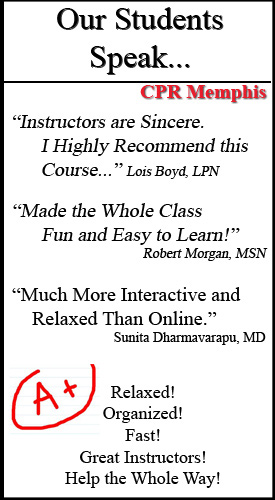What is Asthma By Michelle Pottgen
Call Us Now
Get the Best CPR Class in Memphis Today!
What is Asthma?
Asthma is a condition that affects ones ability to breath. Asthma can be mildly persistent, moderate, or severe. People with asthma will have airways that will always be inflamed. This means that smooth muscle on the inside of the bronchial tube will become swollen, causing the person not being able to get the full amount of air into there lungs a person with out asthma could. Once people have asthma their airways are inflamed even when they feel perfectly fine. This is not necessary until the person with asthma comes into contact with one of their triggers causing an asthma attack.
What Exactly is an Asthma Attack?
An asthma attack is where the bronchial tube (smooth muscle on the inside of the tube) swells while the band of smooth muscle on the outside of the tube becomes constricted. While the mucus layer contracts and produces excess mucus, which drastically reduces the airway opening. At the same time the lungs alveoli become swollen with trapped air.
Who Gets Asthma?
Call Us Now
Get the Best CPR Class in Memphis Today!
Asthma is typically developed in families with history of asthma, allergies, or immune system disorders. Just because both parents and one parent have asthma doesn’t mean that a person will develop it though. Like wise, just because neither of the parents have asthma doesn’t mean that a person cannot develop this disease. Asthma can also be caused by environmental factors.
Sings and Symptoms of Asthma
The most common sings of asthma are wheezing (a scratchy whistle like sound while breathing), shortness of breath, pain in the chest, chest tightness, severe coughing (especially in the morning and evening), and waking up at night not being able to breath or having trouble breathing. If you or someone you know has these symptoms they should seek immediate medical attention.
Patterns in Asthma
When going to a doctor they more than likely will ask when asthma attacks occurs. Common patters that can develop are during/after exercise, during certain seasons, during the evening or morning, or even after laughing/crying. This can also include what kinds of triggers are around when having an asthma attack.
Diagnosis
To be diagnosed with asthma it is necessary to go see a medical professional. While there they shall ask for a medical history (particularly focused on breathing). They will also do a physical of the patient’s lungs and listen to their breathing though a stethoscope. Finally they will ask the patient to take a breathing test. The pulmonary function test is also known as a spirometry. This test will measure the amount of air that person lungs can hold and how fast/slow they breathe. Sometimes the physician will also sometimes request an allergy test. Often times a person’s allergies will be triggers for asthma. This way if they know what they triggers are they can avoid them.
Treatment and Management
Depending on the severity of our asthma, what works for the individual, and what the doctor thinks will determine what medications a person will be put on. There are emergency inhalers, steroid inhalers, nebulizers, and preventives. The steroid inhalers help control the inflammation of the bronchial tubes. The preventives are pills like singular, which a person can take, that will help their susceptibility to asthma attacks. Then there are emergency inhalers like pro air and Xopenex that can be taken to help stop the effects of an asthma attack. A nebulizer is an alternate way to deliver the same medicine that the emergency inhalers carry. A nebulizer is the preferred method to deliver the medicine to the elderly and children.
Triggers for Asthma
There are many different triggers for asthma even if a person doesn’t have asthma they should be careful of other things that could put them in potential danger. Tabaco smoke is one of the most dangerous. Besides the fact if a person has asthma they should be even thinking about smoking, but there is the danger of second hand smoke. Second hand smoke is very hard to avoid and a person can come into contact with it almost anywhere. Dust mites are another trigger. They are microscopic insects that cannot be seen to the naked eye. These bugs are on almost any cloth surface, pillows, mattress, carpet, even a child steady bear will be covered with these guys. Air pollution is the third one. This is where the green, yellow, orange, and red air warnings come into play. People with asthma should pay close attention to the air quality of the day and avoid going out on orange and especially red days. Mold is another asthma trigger. Though people cannot necessary avoid it out in the world or buildings they don’t own; they still can take measures to make sure that their home is mold free. Other types of smoke, like burning brush or wood fire at home can also trigger an asthma attack. Breathing in to much smoke can set off an asthma attack. Strong cologne and perfumes can also make it hard to breath. Though it is hard to say which ones a person will have a reaction to, usually after the strong smells fades it can become tolerable to a person with asthma. Typically it is just after something is sprayed a person will have a reaction.
Other Situations that Effect Asthma
Like being sick, stress can actually make persons asthma worse. Whether it is that upcoming midterm, relationship issues, or being late to work, stress and anxiety can lead to an asthma attack. The emotional response sends different chemicals into the body, which has been noted to lead to an attack. Being sick can also lead to difficulty breathing. A person who gets the flu or a cold will have a harder time fighting off a respiratory disease. Physical activity can also cause an asthma attack. This is called physically induced asthma. Still there are sports like swimming that do not aggravate the asthma as much and makes it possible for the person to stay active. Whether can make it especially hard to breath. Not just the air pollution but what the air its self is like. For asthmatics they have a difficult time breathing in cold dry air or humid air.
References
Web MD
“Asthma: Diagnosis & Tests.” WebMD. WebMD, n.d. Web. 24 May 2013. http://www.webmd.com/asthma/guide/asthma-diagnosis-test
Feature, Katherine KamWebMD. “Asthma, Stress, and Anxiety: A Risky Cycle.”WebMD. WebMD, n.d. Web. 24 May 2013.
http://www.webmd.com/asthma/features/asthma-stress-and-anxiety-a-risky-cycle
“Asthma: Treatment & Care.” WebMD. WebMD, n.d. Web. 24 May 2013. http://www.webmd.com/asthma/guide/asthma-treatment-care
CDC
“Asthma Basic Information.” Centers for Disease Control and Prevention. Centers for Disease Control and Prevention, 24 Apr. 2009. Web. 24 May 2013. http://www.cdc.gov/asthma/faqs.htm
AAAAI
“Asthma.” Aaaai.org. American Academy of Asthma Allergies and Immunology, n.d. Web. 24 May 2013. http://www.aaaai.org/conditions-and-treatments/asthma.aspx









